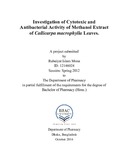| dc.contributor.advisor | Akter, Dr. Raushanara | |
| dc.contributor.author | Mona, Rubaiyat Islam | |
| dc.date.accessioned | 2017-07-23T06:59:34Z | |
| dc.date.available | 2017-07-23T06:59:34Z | |
| dc.date.copyright | 2016 | |
| dc.date.issued | 2016-10 | |
| dc.identifier.other | ID 12146024 | |
| dc.identifier.uri | http://hdl.handle.net/10361/8336 | |
| dc.description | This project report is submitted in partial fulfilment of the requirements for the degree of Bachelor of Pharmacy, 2016. | en_US |
| dc.description | Cataloged from PDF version of project report. | |
| dc.description | Includes bibliographical references (page 47-51). | |
| dc.description.abstract | Callicarpa macrophylla (family: Verbenaceae) has been commonly used in traditional medicine for a wide range of ailments related to the circulatory, digestive, endocrine, respiratory and skeletal systems as well as to infectious diseases. The purpose of the study was to evaluate the cytotoxic and antibacterial effect of Callicarpa macrophylla (C. macrophylla) leaf extract. The cytotoxic potential of the extract was examined on HeLa (a human cervical carcinoma cell line) cells using MTT assay and the antibacterial activity was assessed by disc diffusion method. The highest cytotoxic potential (92% cell growth inhibition) was evident at the concentration of 2.5 mg/mL and the lowest cytotoxic potential (7% cell growth inhibition) was found at the concentration of 0.25 mg/mL. The extract exhibited the cytotoxic activity in a concentration dependent manner. This extract showed potent cytotoxic activity with an IC50 value of 1.38 mg/mL. The antibacterial activity of methanol extract of the plant was investigated and low to moderate antibacterial activity against the tested bacterial strains was showed by the extract compared to the kanamycin that was used as a positive control. The highest antibacterial activity (zone of inhibition 22 mm) was found for Bacillus cereus at the concentration of 350 μg/disc. The results of study clearly indicated the presence of cytotoxic and antibacterial properties of the methanol extract. Phytochemical screening of this plant extract showed the presence of flavonoids, tannins, steroids and glycosides. The potent cytotoxic effect may be due to the presence of flavonoids, tannins, and glycosides and the potent antibacterial effect may be due to the presence of tannins and steroids. Thus, this study finding provide a scientific basis for the use of this plant as traditional medicine in the treatment of cancer and infectious disease and its further investigation and commercial exploitations of the plant. Future work will be focused on isolation of compounds which are responsible for cytotoxic and antibacterial activity and on new bioactivity investigation of the plant extract of C. macrophyllay. | en_US |
| dc.description.statementofresponsibility | Rubaiyat Islam Mona | |
| dc.language.iso | en | en_US |
| dc.publisher | BRAC Univeristy | en_US |
| dc.subject | Callicarpa macrophylla | en_US |
| dc.subject | Herbal drug | en_US |
| dc.subject | Cancer | en_US |
| dc.title | Investigation of cytotoxic and antibacterial activity of methanol extract of callicarpa macrophylla leaves | en_US |
| dc.type | Project report | en_US |
| dc.contributor.department | Department of Pharmacy, BRAC University | |
| dc.description.degree | B. Pharmacy | |

